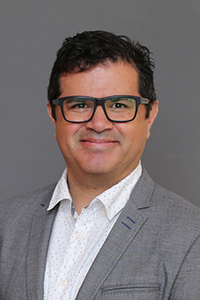Roberto Zenit, Ph.D.
Royce Family Professor of Teaching Excellence in Engineering
Brown University
Date: Tuesday, April 9, 2024
Location: Health Professions, Nursing & Pharmacy Auditorium
1225 Center Drive, HPNP 1404
Title: “Hydrodynamic instabilities as tools in modern artistic painting”
Roberto Zenit, Ph.D.
Royce Teaching Professor of Teaching Excellence
Brown University.
Abstract:
Fluid mechanics is a subject that is important to many, if not all, human activities. Art is not an exception. Artists, mostly painters but not exclusively, learn how to manipulate the material properties and the flow of liquids to produce textures, shapes, and forms to create their objects of aesthetic value. From the view of fluid mechanics, many of the processes of creation can be understood from a fundamental point of view. This understanding can be used to train new artists, re-interpret pieces of art and to explore new avenues of artistic creation. Conducting research in this area can be inspiring, engaging and innovative. In this talk, an analysis of some notable painting techniques is presented from the point of view of fluid mechanics, specifically hydrodynamic instabilities. In particular, we discuss the so-called “accidental painting” technique, originally devised by David A. Siqueiros, which is the result of a Rayleigh-Taylor instability. An analysis of several techniques used by Jackson Pollock is also presented, showing how he learned to carefully control the motion of viscous filaments to create his famous abstract compositions. We also briefly discuss how patterns and textures are produced in decalcomania and watercolor painting. These investigations indicate that it is possible to establish concrete scientific discussion among modern fluid mechanics, art, art history and conservation.
Bio:
Roberto Zenit received his Ph.D. from the Mechanical Engineering Department at Caltech in 1998. After a postdoctoral period at Cornell University, he moved to Mexico City in 2000 to become a faculty member at the Universidad Nacional Autónoma de México (UNAM), eventually becoming a Full Professor of Mechanical Engineering and a researcher at the Instituto de Investigaciones en Materiales, both at UNAM. He is now a Professor of Engineering at Brown University. He is a fellow of the APS, a member of the Mexican Academy of Sciences and the Academy of Engineering of Mexico. His area of expertise is fluid mechanics; he has worked in a wide variety of subjects including multiphase and granular flows, biological flows, rheology, and more recently, the physics of artistic painting.
The Department of Chemical Engineering, part of the Herbert Wertheim College of Engineering, is one of the largest and highest ranked chemical engineering departments in the Southeast region and the premier chemical engineering department in the State of Florida. The department’s faculty and students conduct fundamental and applied research addressing important societal problems while advancing the discipline of chemical engineering in topics such as fluid mechanics, colloid and interface phenomena, biomolecular engineering, nanotechnology, advanced materials, catalysis and surface science.
PREVIOUS DISTINGUISHED SPEAKERS IN THE FLUID MECHANICS ENDOWMENT SERIES
| 2023 | Norman J. Wagner | University of Delaware |
| 2022 | Jeffrey F. Morris | City College of New York |
| 2019 | Howard A. Stone | Princeton University |
| 2017 | Harry Swinney | University of Texas at Austin |
| 2015 | Grae Worster | University of Cambridge |

